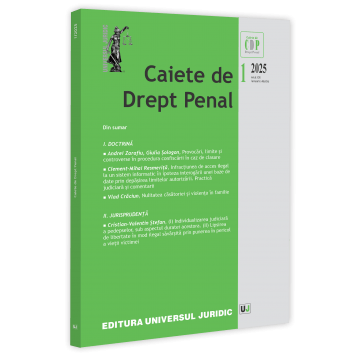Recunoaşterea şi executarea unei hotărâri penale pronunţate în România de un stat membru al Uniunii Europene
DOI:
https://doi.org/10.24193/CDP.2025.1.6Cuvinte cheie:
principiul recunoașterii reciproce, Decizia-Cadru 2008/909/JAI, Mandatul european de arestare, efectele recunoașterii, recunoașterea incidentală, recunoașterea și executarea unei hotărâriRezumat
Scopul acestui articol este de a analiza principalul mecanism de cooperare internațională între statele membre ale Uniunii Europene, și anume recunoașterea și executarea hotărârilor judecătorești însă cu privire la situațiile în care România este statul emitent al unei hotărâri definitive de condamnare la o pedeapsă penală, iar un alt stat al Uniunii Europene este cel în care hotărârea se va pune în executare.Odată cu crearea Spațiului Comun European, care stabilea pe lângă altele și libertatea de mișcare a persoanelor, între state au apărut și probleme de ordin legal cu privire la posibilitatea inculpaților de a părăsi țara în care sunt judecați și de a face mult mai dificilă punerea în executare a unui mandat de către statul emitent al hotărârii de condamnare. Inculpații alegeau să plece în alte țări chiar cu scopul de a fi găsiți mai greu și de a nu executa pedepsele în penitenciar, în final intervenind prescripția executării pedepsei.
Corelativ, pentru a combate astfel de comportamente s-au dezvoltat la nivel unional mecanisme de cooperare eficientă între state pentru a conduce la prinderea celor condamnați la punerea în executare a pedepselor chiar și în statele în care aceștia se află. Așadar, de-a lungul timpului s-au conturat condițiile în care aceste mecanisme pot funcționa cât mai eficient și prin intermediul unor Decizii-cadru s-au instituit o serie de reguli minimale pe care statele trebuie să le reglementeze la nivel intern. Prin aceste instrumente se încearcă asigurarea respectării tuturor drepturilor fundamentale ale persoanelor și posibilitatea acestora de a executa pedeapsa în statul membru al cărui cetățean este, creând pentru acesta un mediu mai favorabil pentru reabilitare și reintegrare socială datorită apartenenței la acel loc.
În acest articol vom analiza maniera concretă în care legiuitorul român a transpus Decizia-cadru 2008/909/JAI privind aplicarea principiului recunoaşterii reciproce în cazul hotărârilor judecătoreşti în materie penală care impun pedepse sau măsuri privative de libertate în scopul executării lor în Uniunea Europeană și care sunt diferențele dintre ceea ce s-a impus la nivel european și ceea ce avem noi reglementat și totodată condițiile necesare pentru recunoașterea și executarea unei hotărâri penale pronunțate în România de către un alt stat. În final vom contura pe larg efectele unei astfel de proceduri, dar și posibilitatea unei recunoașteri pe cale incidentală, în situația refuzului statului în care se află condamnatul de a executa mandatul european de arestare emis pentru acea persoană de către România.

